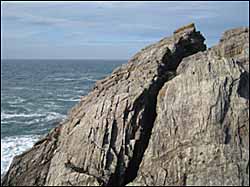
|
Podcast

|
Maturity
Encouragement
Good News
Church
Communion
Prayer
Christian Symbols
Scholarly Articles
Miscellany

|
Easter
Thanksgiving
Pentecost
Stations of the Cross

|
New Testament
Gospels
Acts
Paul's Letters
General Letters
Revelation
Topical Studies

|
Bible Studies
Articles
Books
Podcasts
Search
Menu
Donate
About Us
FAQ
Contact Us
Site Map
 Photo: Rod Allday, 'Cleft in the rock known as High Place', CC BY-SA 2.0. Located below Towan Head, Cornwall, UK |
I must have sung Augustus Toplady's hymn "Rock of Ages" a hundred times or more, but as I sang it this last Sunday morning, I began to weep as the words struck me anew.
"Rock of Ages, cleft for me,
Let me hide myself in Thee;
Let the water and the blood,
From Thy riven side which flowed,
Be of sin the double cure,
Cleanse me from its guilt and pow'r."
I've long recognized that the author is referring to Jesus as the Rock,1 just as God is often referred to as the Rock in the Old Testament, especially in the Psalms.2 And that the cleft or crack in a mighty rock is a symbol of God's hiding place and refuge for his children.3
Cleaved
But on Sunday, as I sang the word "cleft," the thought of the violence of the cleaving the rock broke my heart and brought tears to my eyes. "Cleft," of course, is the past tense of "cleave" -- "to divide by or as if by a cutting blow, split."4 A rock that has a "cleft" has been cleaved or split by powerful forces and broken asunder with a mighty crack and deafening boom as patient, inexorable pressures finally explode within the rock, creating a giant fissure that runs down to its very core. Cleaving is a violent word. A meat cleaver is never used by the butcher gently, but is a violent tool.
Toplady also refers to "the water and the blood from Thy riven side which flowed," a reference, of course, to a proof of death, a soldier's spear thrust into Jesus' abdomen that brought a sudden flow of blood and water (John 19:34). "Riven" is another violent word, "to split with force or violence,"5 from Old Norse rifa, "to tear apart."
Riven
"Cleaved" and "riven" point to the violence of the cross, the focal point of history, where Christ the Son calls out to his absent Father,
"My God, my God, why have you forsaken me?" (Matthew 27:46)
Christ, the Son, is bearing in his body on "the tree" the sins of all the world.6 All the ugly, disgraceful, disgusting, conniving, dishonest, self-serving things done by me, and you, and by all the men and women that have lived on this globe from Adam forward until Christ returns. All that filth defiles the pure soul of the Holy One of God, and the broken-hearted Father turns away, if but for a moment. The Father and Son are split in two for that moment -- cleaved, riven. And why? For me!
"Let the water and the blood,
From Thy riven side which flowed,
Be of sin the double cure,
Cleanse me from its guilt and pow'r."
Violence
The violence Jesus suffers, that he takes upon himself, he bears for me. Jesus is under no illusion:
"The Son of Man will be betrayed.... They will condemn him to death and will turn him over to the Gentiles to be mocked and flogged and crucified." (Matthew 20:18--19)
Peter says to us -- to me:
"By his wounds you have been healed." (1 Peter 2:24)
By his wounds, by his grievous wounds, by his fatal wounds from being violently cleaved and riven, I am made whole. Yes, I am healed, but the enormous hospital bill that would have bankrupted me has been paid by another with "the precious blood of Jesus" (1 Peter 1:19).
My dear friend, I am sorry if mentioning Jesus' blood offends you, but the New Testament mentions Jesus' blood shed for me at least 32 times. It is a reminder of the violence of that day.
"Rock of Ages, cleaved for me,
Let me hide myself in Thee."
And I am hidden in him!7 He is my hope, who endured the violence of man to save me, to save us all. And that is why I wept last Sunday, remembering afresh the powerful, costly, healing love of Jesus.
[1] Isaiah 8:14; 28:16-17a; Daniel 2:44-45a; Psalm 118:22-23; Matthew 21:42-44; Acts 4:11; Ephesians 2:20; 1 Peter 2:4-8; 1 Corinthians 10:4.
[2] Genesis 49:24; Deuteronomy 32:4, 15; 2 Samuel 22:2; Psalm 18:2; 31:2-3; 61:2-3; 71:3; 89:26; 92:15; 144:1-2; Isaiah 44:8; 51:1; etc.
[3] Exodus 32:21-23. Psalm 91:1-2; etc.
[4] "Cleave," Merriam-Webster.com Dictionary, Merriam-Webster,
[5] "Riven," Merriam-Webster's 11th Collegiate Dictionary.
[6] 1 Peter 2:24.
[7] Colossians 3:3-4.
Copyright © 2026, Ralph F. Wilson. <pastor![]() joyfulheart.com> All rights reserved. A single copy of this article is free. Do not put this on a website. See legal, copyright, and reprint information.
joyfulheart.com> All rights reserved. A single copy of this article is free. Do not put this on a website. See legal, copyright, and reprint information.

 To be notified about future articles, stories, and Bible studies, why don't you subscribe to our free newsletter, The Joyful Heart, by placing your e-mail address in the box below. We respect your
To be notified about future articles, stories, and Bible studies, why don't you subscribe to our free newsletter, The Joyful Heart, by placing your e-mail address in the box below. We respect your